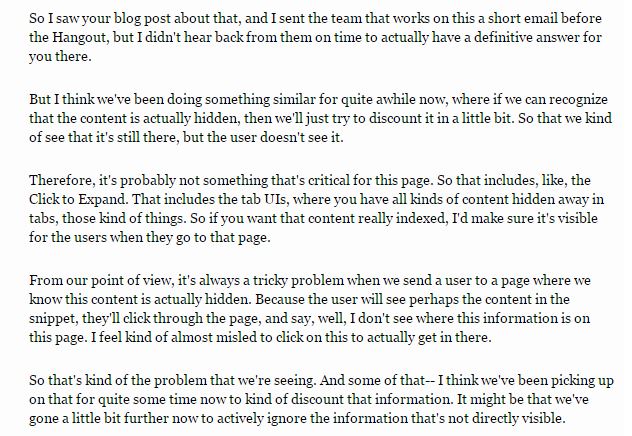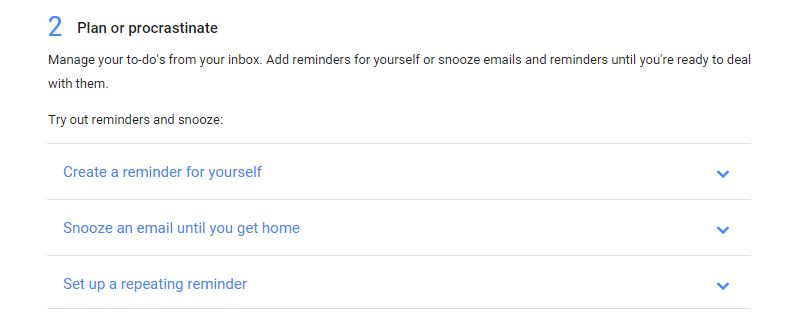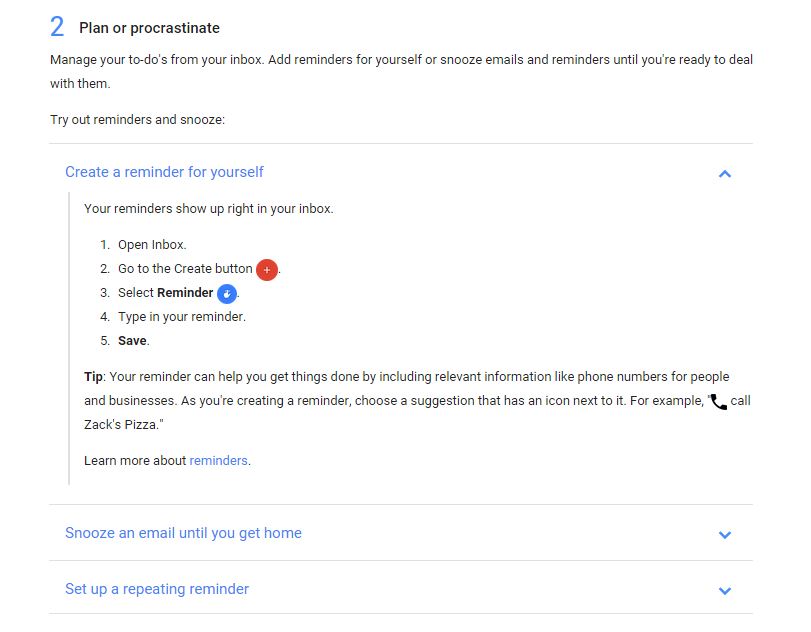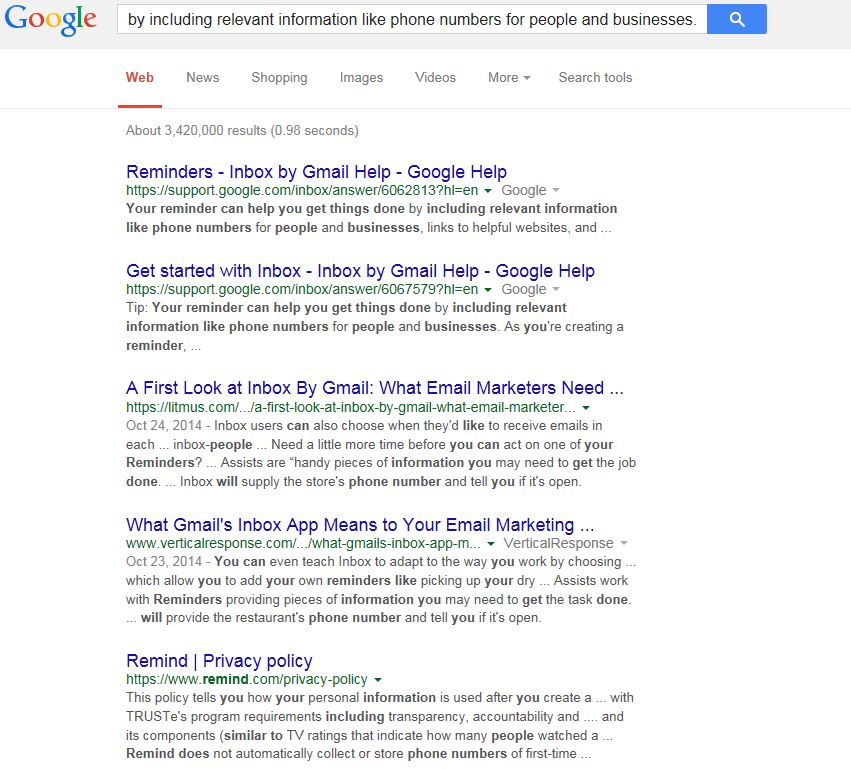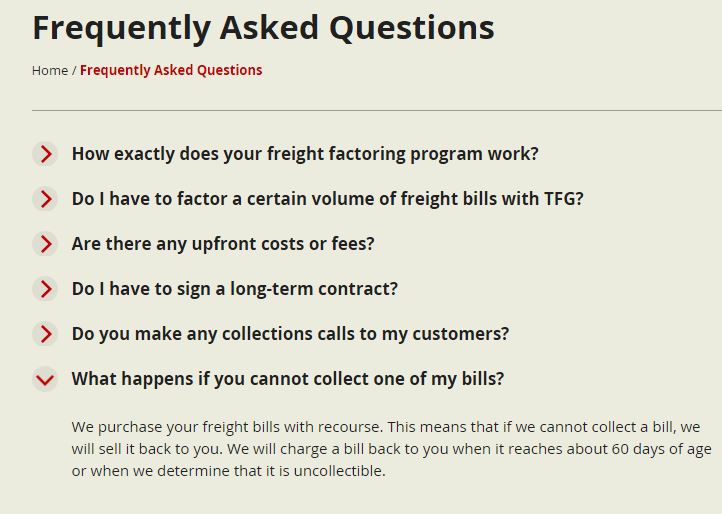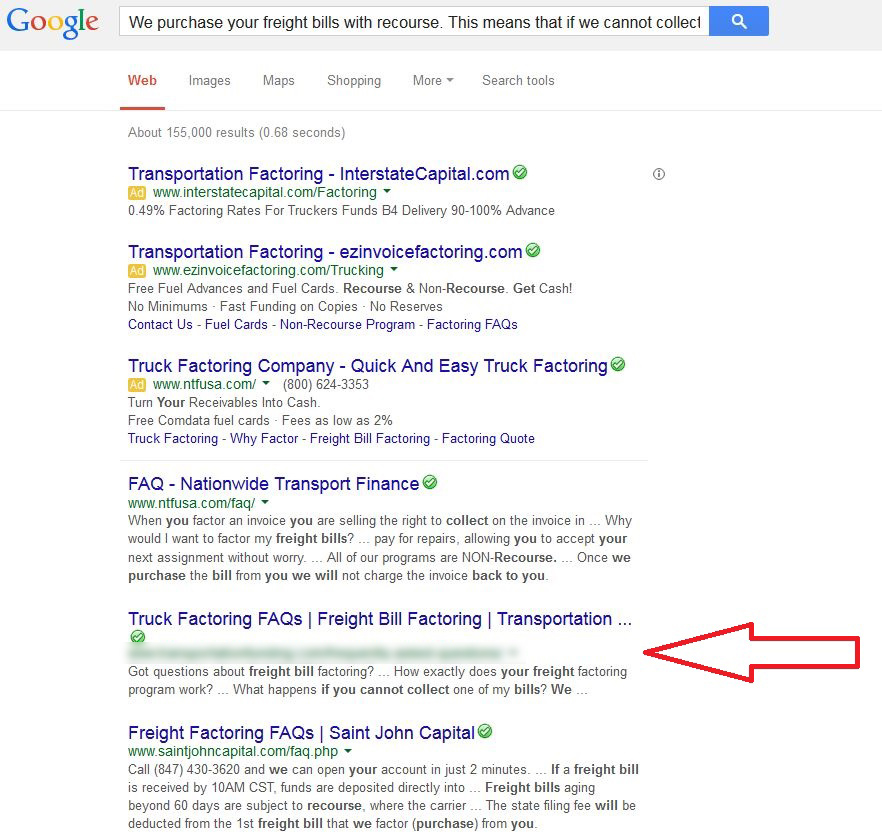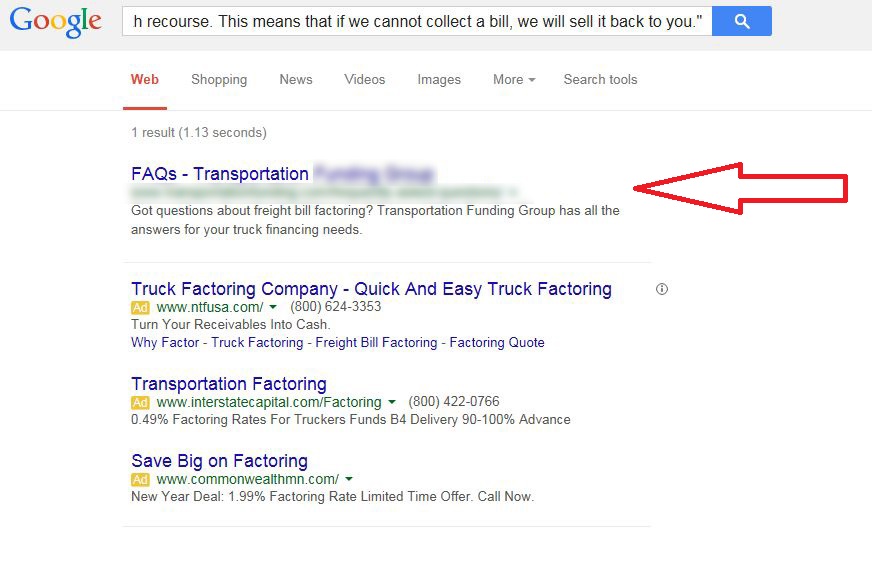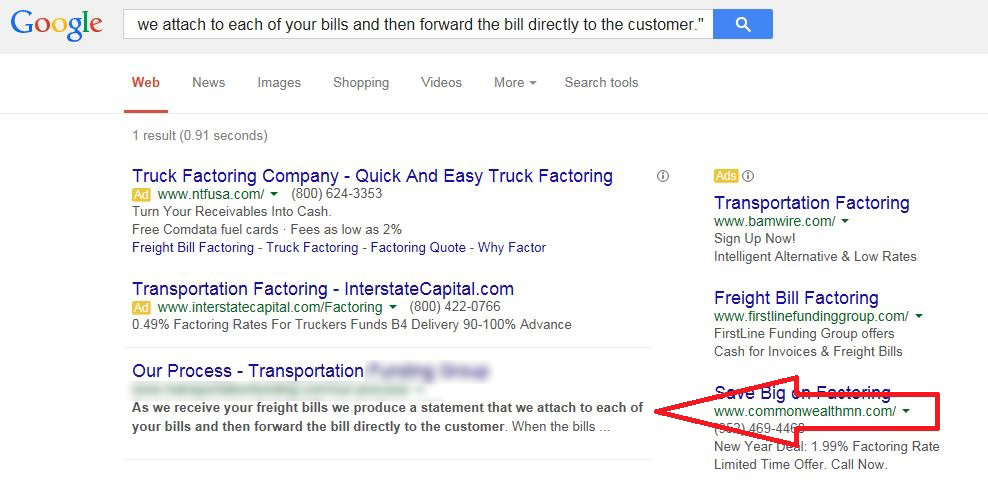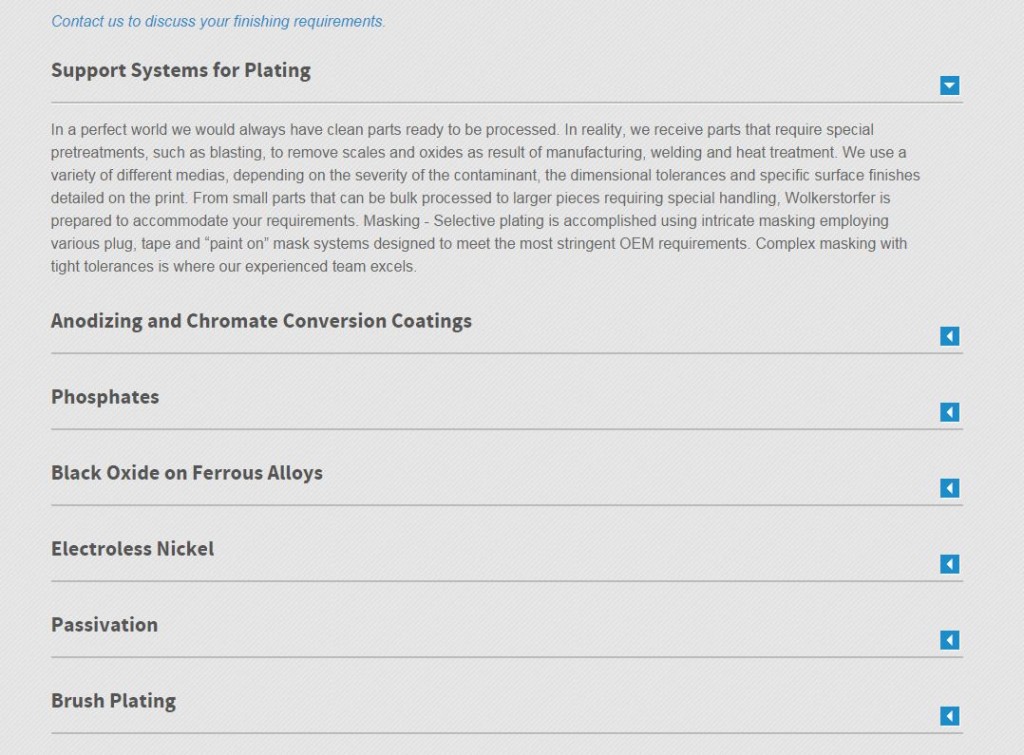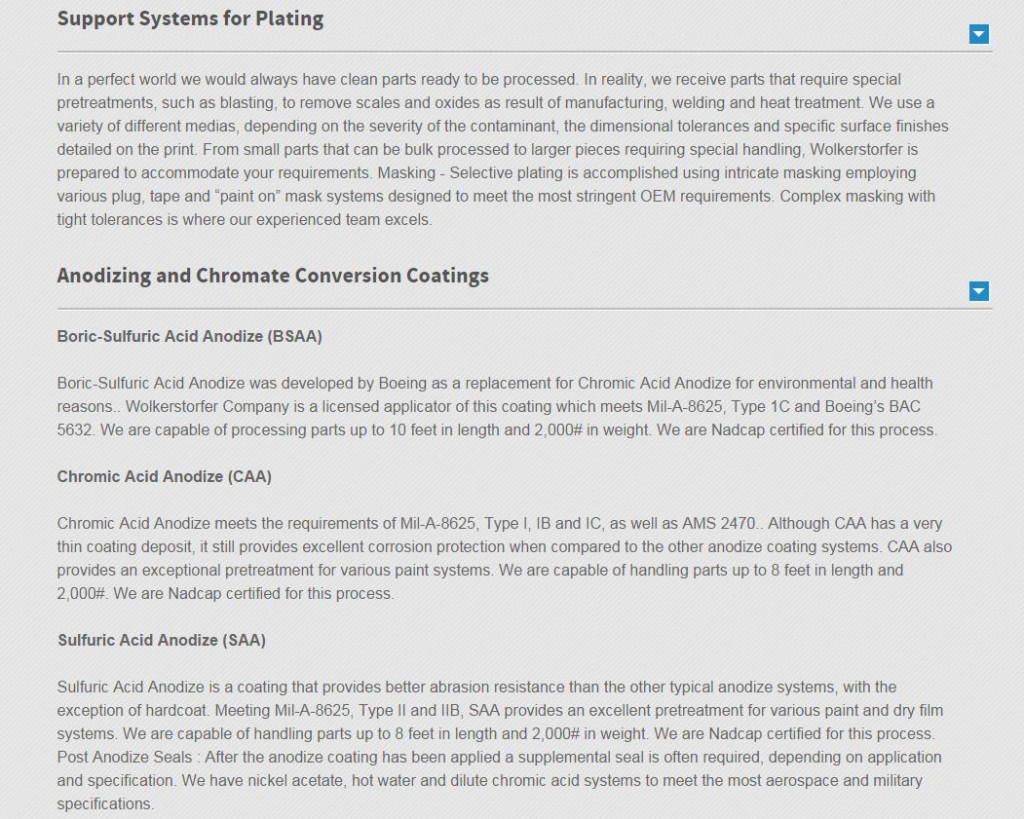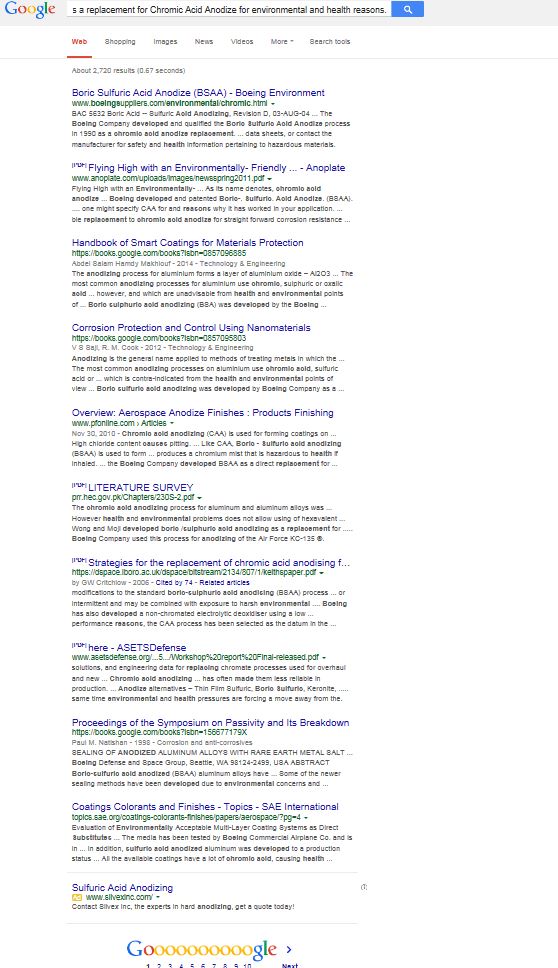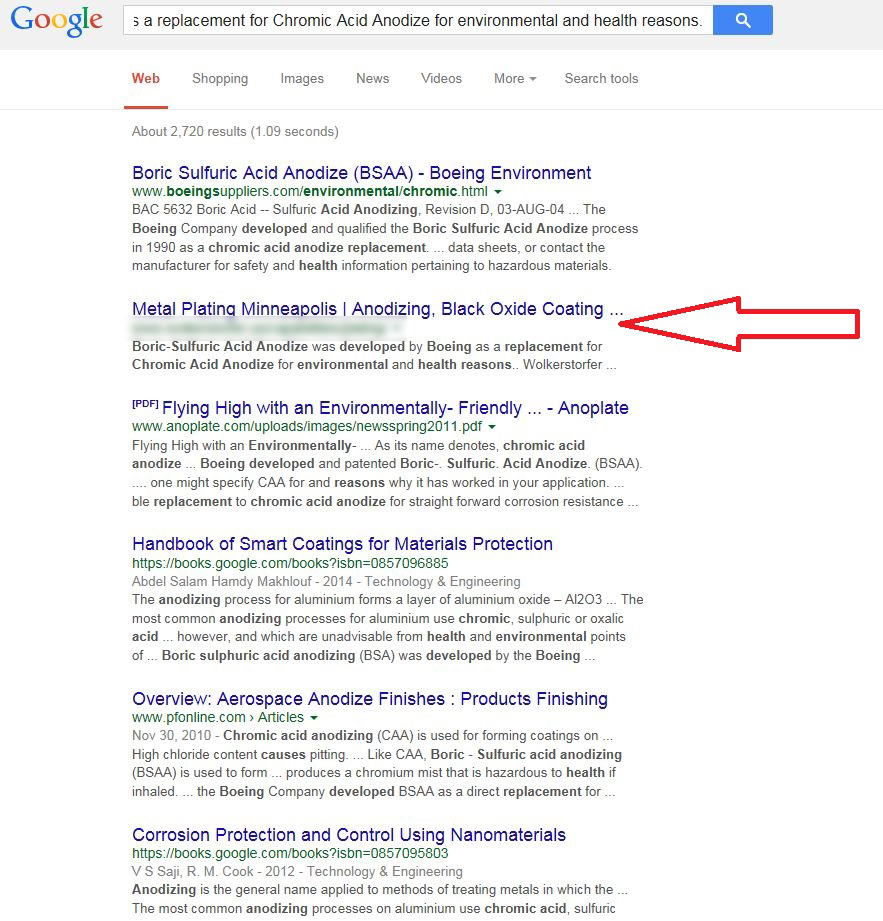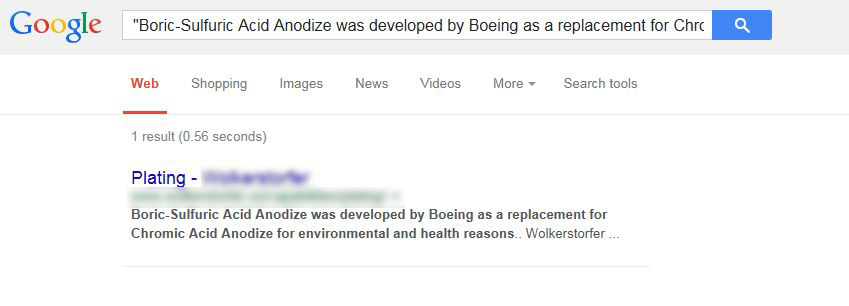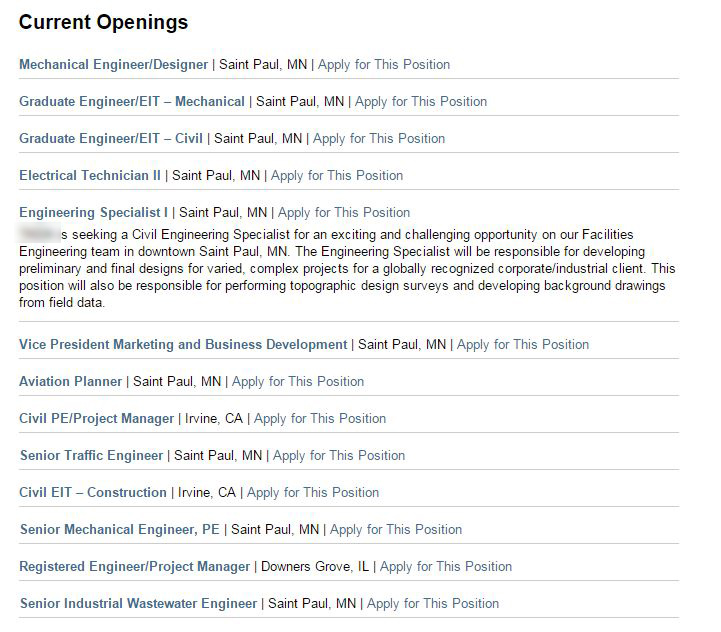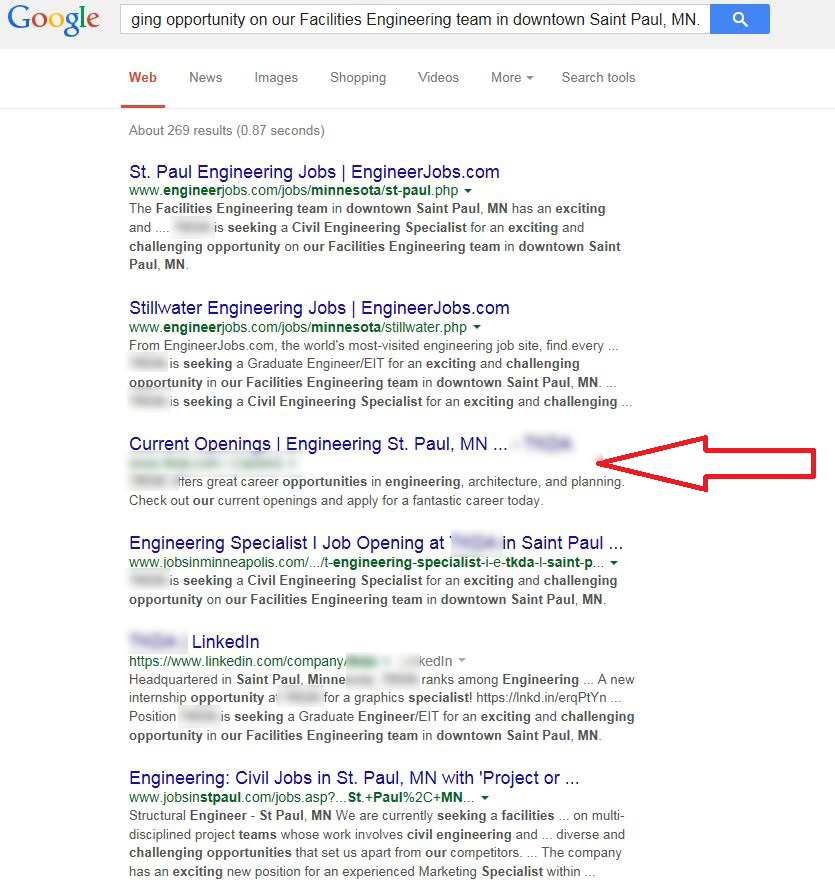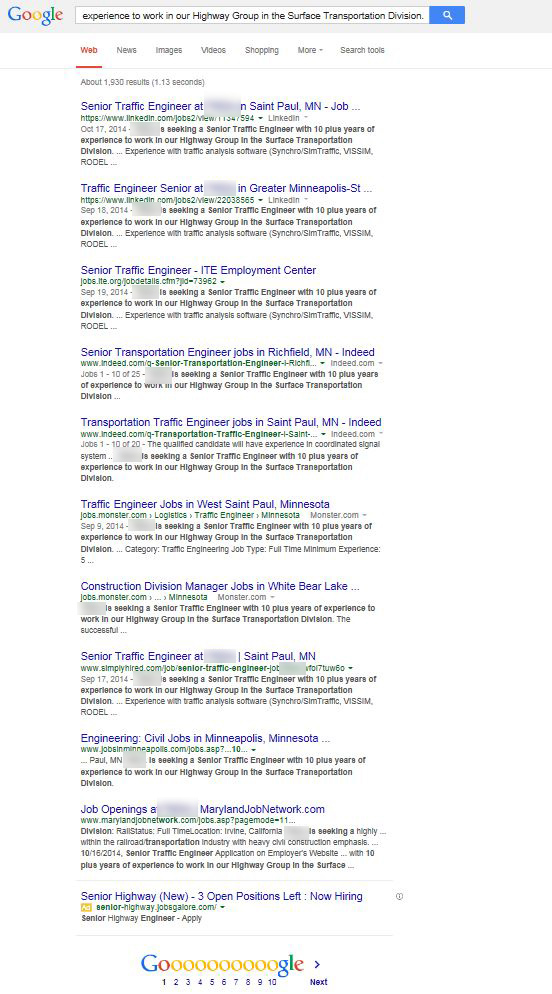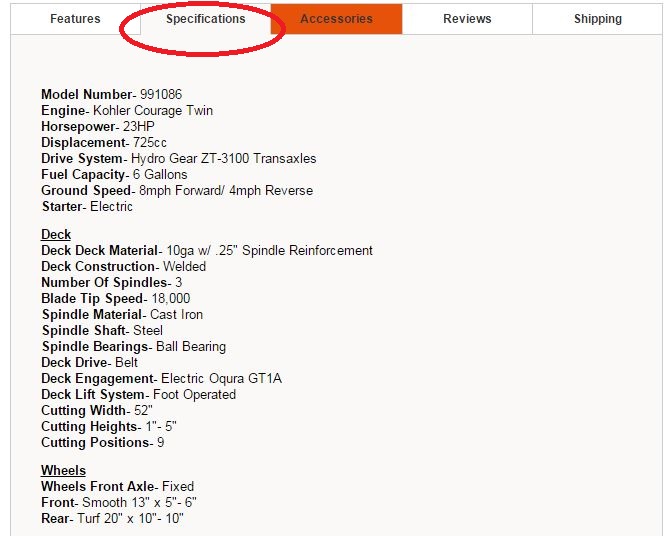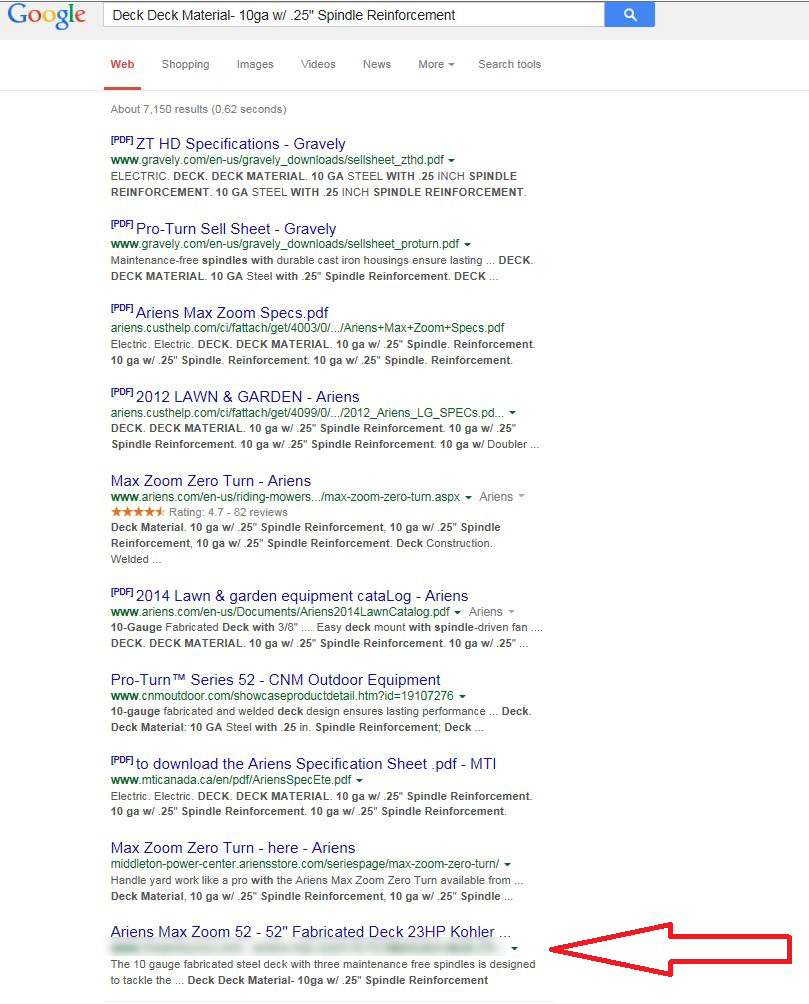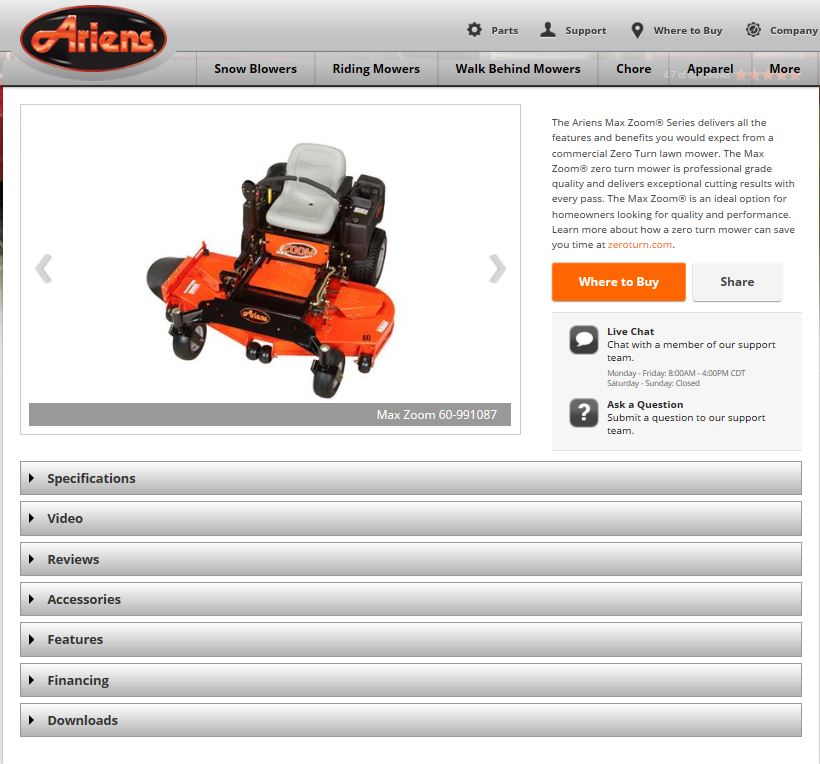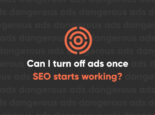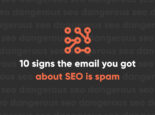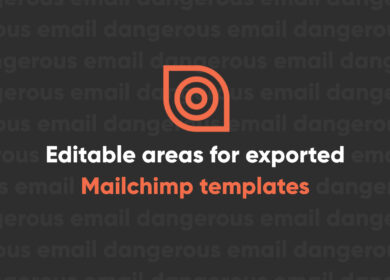
Searching for Hidden Content: Is Google Indexing You?
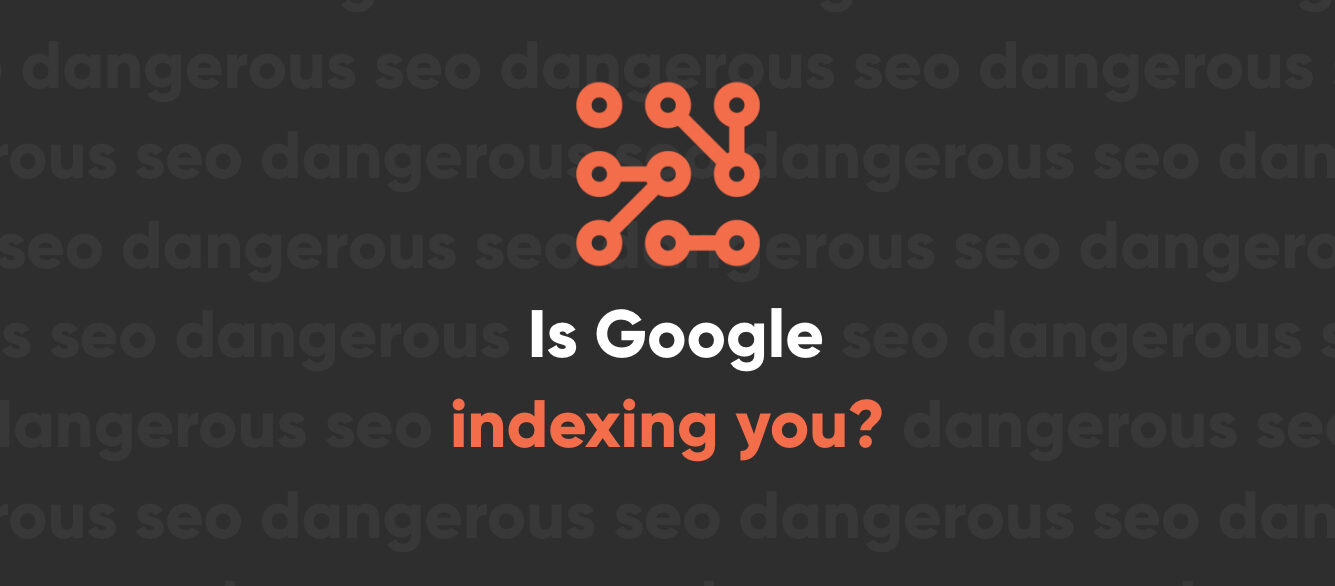
You can’t read what you can’t see. Until you can see it, that is. But can Google see it?
Many websites today utilize expandable areas or tabs that include more content the user can see with a simple click. This seems like good usability in many cases. Does the visitor need to see all of that info on page load? Probably not. Plus, those little accordion boxes are so much fun for everyone!
But what do the search engines think about this content?
Google’s Stance on Hidden/Tabbed Content
In a Google Hangout back in November 2014, Googler John Mueller suggested that content not immediately visible on a page—such as content within a tab or a "click to expand" area—may get less than favorable treatment from Google. Here’s an excerpt:
While Mueller wasn’t 100% certain—note the usage of words like "think" and "might"—he seemed pretty certain that Google doesn’t think "hidden" content is as important as content that’s immediately visible to users. His advice: if you want content really indexed, then make it visible.
In other words, the content you place in these non-visible areas might be discounted in the search results—or possibly not indexed at all.
But wait a minute. Isn’t this contrary to what Matt Cutts said back in 2013? In fact, he said nearly the exact same thing twice:
In both cases, Cutts seems confident that tabbed or hidden content isn’t a problem—as long as it isn’t spammy content. As long as you are giving the users the same experience as the search engines, then you should be okay.
Of course, that was 2013. We’re not in 2013. Maybe Google has changed its position on this, or maybe John Mueller just didn’t know the answer. Whatever the case, it’s something worth exploring. So that’s exactly what we did.
How Well Does Google Index Tabbed/Hidden Content?
There are two questions we are looking at here:
- Does Google index tabbed/hidden content?
- Does Google discount the value of that content?
Of course, if the answer to the first question is "No," then we can quit our study right away—and then redesign all of our websites to eliminate any content that isn’t immediately visible on page load.
There’s also a third question we’ll also need to explore: Is there a specific way we need to handle this hidden content to ensure maximum indexing potential (aside from just making it all visible)?
Before we get too far into our exploration, let’s take a quick peek at how Google handles their own hidden content. If you browse through Google’s support pages, you’ll find plenty of this "hidden" content. Here’s an example:
Now, let’s Google the tip that’s hidden in the "Plan or procrastinate" section. (Note: All searches for this study were conducted from a browser with no history, cookies, or cache. I was not logged into Google during any of these searches.)
Bam! There it is, indexed word-for-word. When I click on the search result, I don’t see that text anywhere on the page. Gasp! I have to click those little arrows to gain access to that text. The horror!
Okay, but that’s Google. Of course Google indexes Google. When it wants to, that is. There are plenty of examples of Google hidden content (like the Adwords support section) that don’t seem to be indexed. But it’s quite possible that Google doesn’t want this content indexed. (For the record, Bing seems to index Google’s hidden content the same way.)
So what about tabbed/hidden content on other websites?
Now, the quickest way to see if content is indexed is to grab a chunk of text and conduct a search. If the page comes up in the results, then we know that content is indexed. This won’t tell us how well it’s indexed, but it will at least answer our first question.
Quick side note: There is more than one way to hide content on a page. All tests were conducted using content that is visible in the page’s source code (HTML) immediately on page load. If your content isn’t visible in the HTML on page load, then it makes sense that Google wouldn’t index it; after all, Google wouldn’t even know it’s there. Google is not going around and clicking on your site.
Tabbed/Hidden Content Experiment #1 (FAQs)
Okay, back to the experiment. Let’s see what happened when we took some hidden content and Googled it:
Our site shows up second in the organic results (after all those wonderful ads), sandwiched between two other FAQ pages with similar (but not the same) content. Neither of those pages uses hidden content. What’s most interesting here is that the first result is for a non-recourse company when we were specifically searching for information that talks about recourse factoring. So the more relevant result is in second. Seems like it could be a small demotion.
If we throw the content in quotes, it’s the only organic result and moves above the ads.
But do you notice anything unusual? If we compare it to the search result for content from the same site that isn’t hidden, we see one major difference:
The quoted text is bolded for the non-hidden content. The quoted text does not appear anywhere in the snippet for the hidden text (although it did for Google’s hidden text). Obviously the content is indexed or it couldn’t trigger that page in the SERP. But it’s not being treated the same way. Does this mean it is discounted? Let’s not jump to conclusions just yet.
Tabbed/Hidden Content Experiment #2 (Informative Content)
Let’s try content from a different website.
Wow, look at all that hidden content. It’s like a goldmine! There’s an obvious purpose for hiding the content here. It allows the user to see all of the services immediately and only read about the ones of interest. In no way is this an attempt to tell Google the content isn’t as important.
So let’s search for it:
Huh. Not even on page one for content that appears word-for-word on the site. It doesn’t appear word-for-word on these other sites. That’s a serious demotion.
At this point, I tried something different. I decided to fetch this page in Google Webmaster Tools. The page was already indexed and appearing in other search results, but I wondered if a fetch would somehow give that hidden content a boost.
After a few days, I searched again (browser cache and history cleared, not logged in). Here’s what happened.
Wow. We’re suddenly in second place. It’s interesting that now we do see the search words bolded.
Let’s add the quotes and see what happens:
Now it’s the only result (and no ads). We still see the bold. Maybe Google is getting wise to what I am doing. Or maybe that fetch really helped. (After seeing the sudden results generated by this fetch, I decided to go back and fetch the page from the first site I tested. No luck getting the snippet to show the searched content.)
Tabbed/Hidden Content Experiment #3 (Job Listings)
Let’s try another site. This one has job listings that also appear word-for-word on other websites (such as LinkedIn).
Okay, now let’s search.
Our site gets number three here. Not a huge demotion, but our page doesn’t have the quoted text in the snippet. What if we try an older job listing?
Now we’re not even on page one, and one of the page one results doesn’t even have the quoted text. It’s probably worth noting that all of the sites ranked in both searches have all content visible on page load, not hidden.
This is turning out to be quite the conundrum.
We’ve reached at least one conclusion so far though: Google does index that hidden content.
Tabbed/Hidden Content Experiment #4 (Product Listings)
Before we look at our second question (Is that hidden content demoted?), let’s take a look at an e-commerce site. It’s very common for e-commerce sites to have tabs that effectively "hide" content from users on page load (although Amazon doesn’t do it anymore). Here’s an example:
On this site, the "Features" tab is open on page load. If you want to see the specs, you need to click the tab. Pretty common experience for product pages. So, what happens if we search for a very specific feature?
Our site is down in 10th place, but the content does appear in the search snippet. The first four results are all PDFs, not product pages. The first result that links directly to the product is for the actual manufacturer’s site. It’s not a surprise that the manufacturer’s site would outrank another retailer. But shouldn’t the manufacturer rank above the PDFs? Well, guess what happens when we visit the manufacturer site...
Well, look at that. The content is hidden on page load! Is that why the first result for the actual product is buried beneath four PDFs (the first two of which took several seconds to load and did not seem to provide an optimal user experience)?
So Does Google Demote Hidden/Tabbed Content?
We know Google indexes hidden content. On to that second question: Is there convincing evidence to suggest that Google discounts or demotes this content? Here’s what we have for evidence:
-
- A search for hidden content triggers the correct page in the search result
- The search result does not always show the hidden content in bold
- Exception #1: When we search Google’s hidden content (sometimes)
- Exception #2: After we fetch from Webmaster Tools (sometimes)
- Exception #3: For product specifications
- When there are competing pages with the same content, pages with the content visible on page load typically appear higher in the search result
- When there are pages with similar content, they often appear ahead of the pages with hidden content
- Hidden content on product pages is often outranked by PDFs
- When we add quotation marks, the page with the hidden content typically jumps up to the top
There is certainly a strong case to be made here that Google does in fact demote hidden content. But the biggest conclusion it seems we can take away from this is that Google indexes and ranks hidden content rather inconsistently. You might be at the top of the search results for some hidden content and nowhere on page one for other hidden content.
So what does all this mean for your hidden content? Here are a few takeaways:
-
-
- Make sure your hidden content is visible in the HTML on page load.
- Don’t hide content if you don’t need to. In other words, only do it if it improves the usability (after all, Google always tells us to optimize for people, not search engines).
- If you’re worried about your hidden content not ranking well, then try fetching the page in Webmaster Tools.
-
I don’t see convincing enough evidence to make me declare that we should no longer design websites with hidden content. As long as you focus on what’s important—having a great site with great content and great usability—you are on the right track. You might just need to take a few extra steps to improve the visibility of that hidden content.
What have you observed about hidden content in Google? Share your own experiences in the comments.

Nate Tower
Nate Tower is the President of Perrill and has over 12 years of marketing and sales experience. During his career in digital marketing, Nate has demonstrated exceptional skills in strategic planning, creative ideation and execution. Nate's academic background includes a B.A. with a double major in English Language and Literature, Secondary Education, and a minor in Creative Writing from Washington University. He further expanded his expertise by completing the MBA Essentials program at Carlson Executive Education, University of Minnesota.
Nate holds multiple certifications from HubSpot and Google including Sales Hub Enterprise Implementation, Google Analytics for Power Users and Google Analytics 4. His unique blend of creative and analytical skills positions him as a leader in both the marketing and creative worlds. This, coupled with his passion for learning and educating, lends him the ability to make the complex accessible and the perplexing clear.
Author
Nate Tower
Categories
Date
Explore with AI
Join Our Newsletter

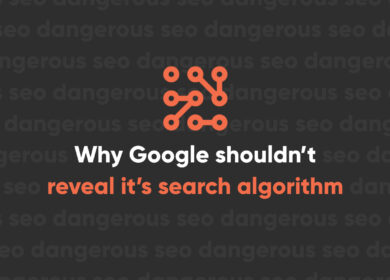
Why Google Shouldn’t Reveal Its Search Algorithm

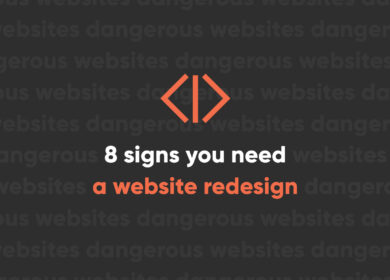
8 Signs You Need a Website Redesign

